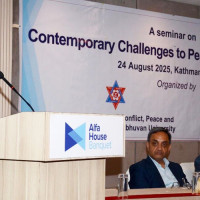- Monday, 25 August 2025
Minister Paudel prioritises reforms to strengthen Nepal’s fragile healthcare system
By A Staff Reporter,Kathmandu, July 20: It has been one year since Pradip Paudel assumed office as Nepal’s Minister for Health and Population. In this short yet impactful time, Minister Paudel has initiated far-reaching reforms aimed at strengthening the nation’s fragile healthcare system.
From expanding federal hospital services to revamping health insurance, his tenure has been marked by both bold policy decisions and grassroots implementation, addressing long-standing gaps in accessibility, affordability and equity.
A major priority under Minister Paudel’s leadership has been the modernisation and expansion of government hospitals. Federal hospitals now operate OPD services in two shifts, easing crowding and providing significant relief to thousands reliant on public healthcare.
Online ticket booking and the repair and procurement of essential medical equipment have also been initiated. By reallocating limited resources more effectively, the ministry has improved service delivery without inflating the budget.
“These efforts are not just service improvements; they are the foundation for transforming the constitutional right to health into an everyday reality for every citizen,” said Minister Paudel.
One of the most notable shifts has been the decentralisation of specialised services, previously concentrated in Kathmandu, across all seven provinces. Burn treatment and cardiac services are now available at provincial hospitals like Bheri and Bharatpur. Plans for human organ transplant services outside the capital are also underway, reflecting a model of federalism in action.
Cancer care has expanded significantly, with free treatment for 37 types of rare cancers and childhood cancer now accessible in public hospitals. This effort has alleviated the financial burden on thousands who previously had no recourse for care within the country.
Health insurance reform has been another cornerstone of Minister Paudel’s tenure. Long plagued by delays and inefficiencies, the health insurance system has undergone sweeping changes.
Citizens can now access services locally, and the previously mandated three-month wait has been reduced to just one month. The introduction of rollover provisions for unused insurance funds and increased benefits for complex cases has boosted public trust and participation.
Furthermore, health insurance has become mandatory for civil servants and returnee migrant workers, increasing coverage while promoting sustainability. A task force has been deployed to implement further reforms, and the Health Insurance Board has tightened oversight to reduce fraud and irregularities.
Prevention has become a central theme under Paudel’s leadership. A landmark HPV vaccination campaign for girls was rolled out nationwide, aiming to drastically reduce cervical cancer incidence. Annual free screenings for non-communicable diseases and cervical cancer are now institutionalised, while congenital disability screenings for newborns have been initiated.
These efforts, Paudel argues, shift the national health agenda from reactive treatment to proactive protection. “We are no longer waiting for illness—we are moving toward a culture of prevention,” he said.
Addressing a chronic shortage of health professionals, Minister Paudel conducted an Organisation and Management Survey, Nepal’s first in years, which paved the way for the hiring of over 2,100 technical staff. Local levels must now appoint Public Health Officers, strengthening grassroots planning and service delivery.
On the education front, MBBS seats have been increased in government medical colleges, and 400 postgraduate seats are being added through the National Institute of Medical Sciences. PG students across both public and private institutions will also receive increased subsistence allowances.
In collaboration with Mahabir Pun’s National Innovation Centre, efforts to repair unused hospital equipment have resulted in substantial savings. The ministry has mandated annual audits of all medical equipment, aiming to prevent unnecessary procurement and ensure optimal use of resources.
One of Paudel’s most praised actions is his targeted health response to long-marginalised communities such as the Tharu. Separate wards and free vaccines for sickle cell anaemia and thalassemia have been introduced. Treatment for strokes and hemophilia is now available free of cost through government hospitals, providing long-overdue support to vulnerable populations.
With millions of Nepalis working abroad, their health concerns have often been overlooked. Minister Paudel initiated virtual consultations via the Shaheed Dharmabhakta National Transplant Centre for migrant workers and introduced free testing upon return. He is also preparing to present Nepal’s case for better employer responsibility in workers' health at the upcoming 78th World Health Assembly.
To bridge the gap between government services and citizens, Paudel launched the “Hello Health” grievance unit, which collects and responds to health complaints via social media, telephone, and email. Meanwhile, work is progressing on establishing a digital health system to integrate patient records and enable efficient care nationwide.
Minister Paudel has made significant strides in policy development. The National Population Policy 2082 addresses demographic imbalances, including declining fertility rates and regional depopulation. Coordination committees between local, provincial, and federal governments have been formed to synchronise responses to national health challenges such as dengue outbreaks and disaster preparedness.
Crucial health-related legislation, including bills on medicines, hospital accreditation, and health worker safety, is being drafted or revised. Referral guidelines have been introduced to streamline patient transfer between hospitals, while the School Health Ambassador programme aims to embed health awareness from a young age.
Under Paudel’s leadership, Nepal has strengthened its international health diplomacy. Negotiations are underway with India to broaden collaboration in Ayurveda, while a draft agreement with the Maldives for postgraduate training is nearing finalisation.
As a result of Nepal’s engagement with GAVI, the annual HPV vaccination programme has now been secured. Additionally, an agreement with Direct Relief has ensured free provision of 37 high-cost cancer medications, offering lifesaving alternatives for patients unable to seek treatment abroad.



-original-thumb.jpg)
-square-thumb.jpg)

-original-thumb.jpg)









